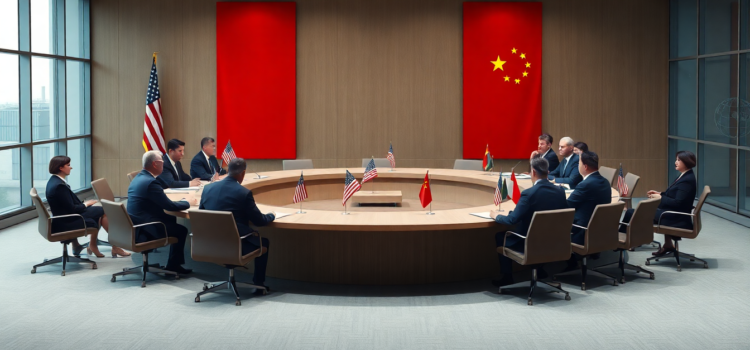
U.S.-China Officials Meet in Geneva to Discuss Trade Tensions and $360 Billion Tariff Impact
Introduction
As trade tensions continue to strain the global economy, U.S. and Chinese officials are meeting in Geneva with a pivotal agenda: to address a staggering $360 billion tariff impact on bilateral trade. The imposition of these tariffs has inflicted considerable economic burdens on both countries, affecting diverse sectors, including agriculture and technology. As such, these Geneva trade talks mark a critical step in revising existing trade policies, aiming to ease trade tensions between the two global giants.
The Current State of U.S.-China Trade Tensions
The introduction of tariffs in recent years has resulted in U.S. importers paying approximately $113 billion in duties from 2018 through mid-2023. Meanwhile, China’s retaliatory tariffs on American exports valued at around $110 billion have strained industries known for competitiveness, notably agriculture and technology. These tariffs have not only escalated trade tensions but also contributed substantially to the global economic burden.
- U.S. Import Duties: Nearly $113 billion paid.
- Chinese Tariffs: Affecting $110 billion of American exports.
- Major Impacted Sectors: Agriculture and Technology.
Key Objectives of the Geneva Trade Talks
The primary goal of the Geneva meeting is to find a conducive path for U.S.-China tariff reduction. The talks focus on comprehensive strategies to alleviate the economic strains caused by these tariffs. As both nations recognize the necessity of collaboration, the discussions are poised to explore bilateral trade agreements that could serve as a long-term resolution to the ongoing trade conflict.
- Objective: U.S.-China tariff reduction.
- Focus: Alleviating economic strains.
- Solution: Exploring bilateral trade agreements.
Potential Outcomes of U.S.-China Economic Negotiations
The success of the U.S.-China trade meeting in Geneva has implications reaching far beyond immediate economic relief. With effective solutions, both countries aim to reduce the tariff burden on the global economy and enhance their bilateral trade relations. Successful negotiations could provide a framework for future discussions in trade imbalance solutions and economic diplomacy initiatives.
- Expected Outcome: Reduced tariff burden on the global economy.
- Future Implications: Enhanced bilateral trade relations.
- Long-term Goals: Trade imbalance solutions, economic diplomacy initiatives.
Impact on U.S.-China Relations
The U.S.-China official talks in Geneva serve as a critical opportunity to reset and redefine trade policies between two of the world’s largest economies. A successful dialogue would not only ease immediate trade tensions but also foster a more stable and mutually beneficial economic partnership. This U.S.-China economic summit could ultimately improve trade relations between U.S. and China, offering a platform for diplomacy in trade disputes.
Conclusion
As U.S. and Chinese officials engage in this vital dialogue in Geneva, the potential to reshape and reduce the $360 billion tariff impact holds great promise for both nations. Through strategic negotiation and compromise, there lies the possibility of not only easing trade tensions but ultimately positioning both countries towards a path of enduring economic partnership. The outcomes of these discussions will be closely watched by global markets and policymakers alike.
Readers are encouraged to share their insights on the potential resolutions and what it means for global trade dynamics in the comments section below.
FAQs
What is the main goal of the U.S.-China trade negotiations in Geneva?
The primary goal is to address and potentially reduce the tariffs impacting $360 billion in trade, thereby easing the economic strain on both nations.
How have the tariffs affected U.S. and Chinese economies?
The tariffs have led to increased costs to businesses and consumers, with U.S. importers paying approximately $113 billion and tariffs affecting $110 billion worth of U.S. exports to China.
What sectors have been most affected by the tariffs?
Key sectors impacted include agriculture and technology, both of which have seen significant economic strain due to the imposed tariffs.
Why are these Geneva trade talks significant?
These talks represent a pivotal effort to ease ongoing trade tensions, aiming to revise trade policies and establish a more cooperative economic relationship.








Comments